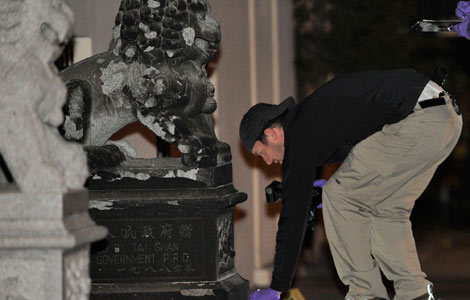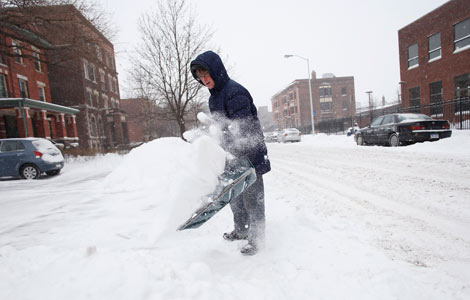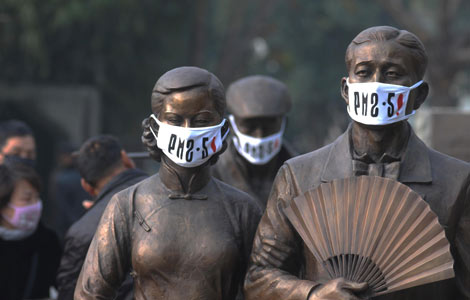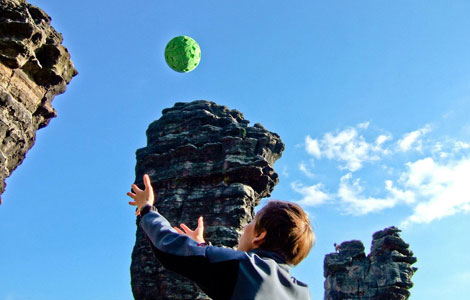Alcohol misuse on the increase
Updated: 2014-01-03 08:32
By Wang Qingyun (China Daily USA)
|
||||||||
Drinkers seek help; related illnesses have steadily risen, doctors report
More people in China are seeking medical and psychological help for alcoholism, according to doctors and patients in Beijing.
The number of drinkers has steadily increased in recent decades, along with reports of alcohol-related illnesses at hospitals nationwide.
A study by the World Health Organization in 2011 found 6.9 percent of Chinese men aged 15 or above had alcohol use disorders, such as regular abuse or dependency, while for women the percentage was 0.22.
Anding Hospital, a mental health facility in Beijing, opened an alcohol dependence ward in 1995. That year it received less than 30 patients, according to doctor Sheng Lixia.
"In 2009, a year before the ward was closed, we had more than 300 patients," she said. "The number that come to the hospital for alcohol-related illness and treatment is higher now."
Sun Hongqiang, director of the alcohol dependence ward at Huilongguan Hospital, shared similar views.
"In 2007, the annual intake was 60. That has since risen to more than 200 patients," he said.
Experts see the steady growth in the number of people seeking treatment and counseling as a sign that more people in China are now aware of the ill effects of alcohol.
Sheng, however, argued that China's economic development and improving lifestyles have also been a major trigger for the rise in alcoholism.
"Most of my patients are male, aged in their 50s or 60s," she said. "They had limited access to alcohol before the 1980s, as they could purchase such beverages only with tickets, and hence had less chance of becoming alcoholic."
The market for alcohol opened up in the 1980s and "most of the people who had been drinking small quantities ended up as dependent over the next decade", Sheng said.
Along with hospitals, there has also been an increase in people turning to support groups such as Alcoholics Anonymous.
Doctors from Anding Hospital and the Sixth Hospital of Peking University set up the first Chinese branch of the AA in Beijing in 2000. Starting with just 10 members, the support group, famous for its 12-step program, now has more than 100, including Chinese and foreigners.
"When we were young, drinking was a luxury. Now it's not uncommon to see people drinking just to get drunk," said an AA member in his 60s on condition of anonymity. She said he has been sober since 1999.
Sheng said many patients complained of work or life pressures.
"Most who come to our clinic also exhibit other psychiatric disorders, such as depression and anxiety," she said, while adding that Chinese drinking etiquette, such as teasing people to drink, are also to blame for the growing number of alcoholics.
"Patients need an environment that is conducive for a complete recovery," she said. "The fact is many of us have and are still urging others to drink during a dinner."
Sun at Huilongguan Hospital agreed and added, "In China, being able to drink is considered competitive as it helps clinch business deals at the dinner table."
This, besides being a cultural shock, also poses a challenge for foreigners in China, according to a Beijing AA member from the United States.
"If you go to a business dinner, everyone wants to see foreigners drink. They keep saying ganbei, ganbei," the 35-year-old said, referring to the Chinese term for bottoms up. "They love to have foreigners drink. I think they do it because they want to be friendly, and they think foreigners love to drink."
The liberal and even encouraging attitude toward drinking has also affected children, said a 34-year-old Chinese woman at Beijing AA.
She said she started drinking at 17 and enjoyed a reputation among her friends for her tolerance. Alcoholism set in when she began to work abroad and used alcohol to cope with homesickness and work pressure.
"I guess the problem might go back to my early years," she said. "People in my family can drink a lot, and they didn't prevent me from drinking even when I was a child."
Sheng said at family dinners in China it is common to see adults dip a chopstick in wine and then let the children taste it for fun.
"But the risk is that the child could grow up and think that drinking is nothing serious," she said, explaining that China has no age ban on alcohol consumption.
"It's common for young people to drink beer at parties or dinner, and easy for them to purchase alcohol from any store or restaurant," she said.
wangqingyun@chinadaily.com.cn
(China Daily USA 01/03/2014 page5)

 The Lego version of Downton Abbey
The Lego version of Downton Abbey
 Police probe fire attack on Chinese consulate
Police probe fire attack on Chinese consulate
 Powerful storm brings Arctic cold, snow to US
Powerful storm brings Arctic cold, snow to US
 Beijing sees little improvement in air quality
Beijing sees little improvement in air quality
 125th Rose Parade celebrated in US
125th Rose Parade celebrated in US
 Cold doesn't dissuade 'Polar Bear Swimmers'
Cold doesn't dissuade 'Polar Bear Swimmers'
 First photos of Liaoning battle group made public
First photos of Liaoning battle group made public
 US First Family out for shave ice in Hawaii
US First Family out for shave ice in Hawaii
Most Viewed
Editor's Picks

|

|

|

|

|

|
Today's Top News
As Obamacare begins, critics launch new assault
FBI: Consulate fire not terrorist act
Smog may affect mental health
New joint command system 'on way'
Chinese helicopter saves 52
US citizens express little hope in govt
China protests US' prisoner transfer
Snowstorm pushes into US Northeast
US Weekly

|

|






